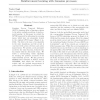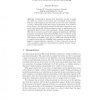509 search results - page 23 / 102 » Compositional Models for Reinforcement Learning |
130
click to vote
ICML
2005
IEEE
16 years 3 months ago
2005
IEEE
Gaussian Process Temporal Difference (GPTD) learning offers a Bayesian solution to the policy evaluation problem of reinforcement learning. In this paper we extend the GPTD framew...
142
Voted
IJCAI
2001
15 years 3 months ago
2001
R-max is a very simple model-based reinforcement learning algorithm which can attain near-optimal average reward in polynomial time. In R-max, the agent always maintains a complet...
133
Voted
ICRA
2010
IEEE
15 years 1 months ago
2010
IEEE
Abstract— Reinforcement learning algorithms have been successfully applied in robotics to learn how to solve tasks based on reward signals obtained during task execution. These r...
130
Voted
WOSS
2004
ACM
15 years 8 months ago
2004
ACM
Components in a decentralised system are faced with uncertainty as how to best adapt to a changing environment to maintain or optimise system performance. How can individual compo...
ECML
2004
Springer
15 years 7 months ago
2004
Springer
Reinforcement learning (RL) algorithms attempt to assign the credit for rewards to the actions that contributed to the reward. Thus far, credit assignment has been done in one of t...


